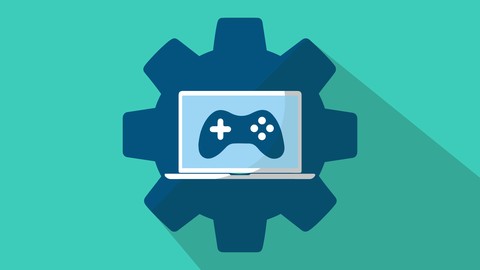
Learn Java Creating Android Games Using the LibGDX library
Learn Java Creating Android Games Using the LibGDX library, available at $64.99, has an average rating of 3.85, with 302 lectures, 1 quizzes, based on 512 reviews, and has 3738 subscribers.
You will learn about Create their own games for Android Understand LibGDX and how to use it for games development Understand and use Entity Component Systems Understand Entity Component Systems and work with Ashley LibGDX extension Understand how to create reusable components for future game development Understand basics of data oriented design Understand what are Entities, Components, Systems in game development Understand different techniques of game development and find what technique is best for your next game Understand how to create professional User Interfaces using Scene2D API Understand asset loading and master asset management Understand how to create useful utilities which help to debug your game Understand how to write clean and maintainable code Understand how to use particle effects Understand how to deal with common exceptions and errors Understand how to check collision between game objects and react on collision Understand how to work with frame buffer objects Understand how to clean up and refactor code This course is ideal for individuals who are Anyone wanting to learn how to write games for Android It is particularly useful for Anyone wanting to learn how to write games for Android.
Enroll now: Learn Java Creating Android Games Using the LibGDX library
Summary
Title: Learn Java Creating Android Games Using the LibGDX library
Price: $64.99
Average Rating: 3.85
Number of Lectures: 302
Number of Quizzes: 1
Number of Published Lectures: 302
Number of Published Quizzes: 1
Number of Curriculum Items: 303
Number of Published Curriculum Objects: 303
Original Price: $69.99
Quality Status: approved
Status: Live
What You Will Learn
- Create their own games for Android
- Understand LibGDX and how to use it for games development
- Understand and use Entity Component Systems
- Understand Entity Component Systems and work with Ashley LibGDX extension
- Understand how to create reusable components for future game development
- Understand basics of data oriented design
- Understand what are Entities, Components, Systems in game development
- Understand different techniques of game development and find what technique is best for your next game
- Understand how to create professional User Interfaces using Scene2D API
- Understand asset loading and master asset management
- Understand how to create useful utilities which help to debug your game
- Understand how to write clean and maintainable code
- Understand how to use particle effects
- Understand how to deal with common exceptions and errors
- Understand how to check collision between game objects and react on collision
- Understand how to work with frame buffer objects
- Understand how to clean up and refactor code
Who Should Attend
- Anyone wanting to learn how to write games for Android
Target Audiences
- Anyone wanting to learn how to write games for Android
Games developers are in huge demand, with many new and exciting opportunities becoming available to programmers who understand the technology.
Are you looking to become a games programmer, but don’t know where to start?
Maybe you are looking for a really comprehensive course on games development, but cannot decide which course to take.
Maybe you have some skills with LibGDX or another games framework, but want to create Android games.�
Whatever the reason, this course will teach you how to become a master games programming, using LIBGDX.
Keep in mind that LIBGDX is cross platform, meaning that you can then move games to other platforms
No previous experience is necessary. Goran Lochert, your course instructor is an expert games developer, who has worked on many games in many frameworks. He is also an official Oracle Java certified developer, and an official contributor to LIBGDX, the games framework used in this course to create games. �
His skills and experiences with LibGDX are second to none.
As a result, you are learning from one of, if not the most experienced Java games developer on Udemy, meaning you can be assured that not only will you learn how to create your own games by following along in this course, but you will also learn the right way to create your game code.
The lack of proper programming techniques is one of the main reasons why games do not perform well, or end up really hard to maintain and update. In addition, learning the wrong way to design and create programming code, can actually harm your career, because employers expect games programmer to write professional code, following accepted industry standards. You will learn how to do that in this course.
Included, is well over fifty hours and hundreds of videos, making this one of the most comprehensive courses of it’s type.
Nothing is glossed over. Goran goes into detail with each and every aspect of games development through the course, so that you actually understand how things work, and can then apply this to your own games projects.
Although the emphasis is on Android in this course, because the course uses LibGDX, which is cross-platform, your games can be deployed to many platforms (PC for one).
Learning how to become a games developer, and how to code the right way, can be difficult. By the end of this course, you will be able to create your own games, and know how to structure and code your games, the way professional programmers do.
If you are ready to join the games industry as a games programmer, then it’s time to get busy learning!
Click the button to sign up for the course and get started today.
Course Curriculum
Chapter 1: Course Introduction
Lecture 1: Introduction
Lecture 2: Install Java Developer Kit and Android Studio
Chapter 2: Java/Design Patterns Introduction
Lecture 1: First Java Application
Lecture 2: Variables And Constants
Lecture 3: Using Operators
Lecture 4: If Else Statement
Lecture 5: While And Do While Loop
Lecture 6: Arrays
Lecture 7: For And Foreach Loop
Lecture 8: Loop Challenge
Lecture 9: Break And Continue Statements
Lecture 10: Using Strings
Lecture 11: String Challenge
Lecture 12: Understanding Null Reference
Lecture 13: Understanding Methods
Lecture 14: Method Overloading
Lecture 15: Overloading Challenge
Lecture 16: Class Constructors
Lecture 17: Getters And Setters
Lecture 18: Encapsulation
Lecture 19: Encapsulation Challenge
Lecture 20: Static Methods
Lecture 21: Static Methods Challenge
Lecture 22: Inheritance
Lecture 23: Method Overriding
Lecture 24: Polymorphism
Lecture 25: Polymorphism Challenge
Lecture 26: Abstract Classes And Interfaces
Lecture 27: Interface Challenge
Lecture 28: Enums
Lecture 29: Code Refactoring
Lecture 30: Understanding List
Lecture 31: Understanding Stack
Lecture 32: Understanding Map
Lecture 33: Composition
Lecture 34: Composition Challenge
Lecture 35: Component Pattern
Lecture 36: Component Pattern Challenge
Chapter 3: Libgdx Introduction / Gdx Sampler Project
Lecture 1: Create Your First Project
Lecture 2: Gdx Sampler Preview
Lecture 3: Understanding application lifecycle
Lecture 4: Understanding Gdx Modules
Lecture 5: Understanding Input Handling : Polling
Lecture 6: Understanding Input Handling : Event Listening
Lecture 7: Input Handling: Summary
Lecture 8: Android Studio tips and tricks
Lecture 9: Introduction to Java Reflection API
Lecture 10: Refactor, DRY and WET code
Lecture 11: Embed LibGDX Window into a Java Desktop Application (Swing)
Lecture 12: Adding Control Panel
Lecture 13: Finishing Sampler
Lecture 14: Understanding Orthographic Cameras
Lecture 15: Understanding Viewports Part 1
Lecture 16: Understanding Viewports Part 2
Lecture 17: Understanding SpriteBatch
Lecture 18: Summary
Chapter 4: Obstacle Avoid Game
Lecture 1: Obstacle Avoid Game Preview
Lecture 2: Creating Obstacle Avoid project
Lecture 3: Intro to ShapeRenderer
Lecture 4: Drawing Shapes with ShapeRenderer
Lecture 5: ViewportUtils class
Lecture 6: Player Class
Lecture 7: Moving Player
Lecture 8: Creating Camera Controller – Move
Lecture 9: Camera Controller Zoom And Reset
Lecture 10: Creating DebugCameraConfig Class Part 1
Lecture 11: Creating DebugCameraConfig Class Part 2
Lecture 12: Using DebugCameraConfig Class
Lecture 13: CameraController Summary
Lecture 14: Blocking Player from leaving the world bounds
Lecture 15: Adding Obstacles
Lecture 16: Refactor Time – create GameObjectBase class
Lecture 17: Collision Detection
Lecture 18: Using Hiero Tool
Lecture 19: Understanding BitmapFont and GlyphLayout
Lecture 20: Adding Lives to HUD
Lecture 21: Adding score to HUD
Lecture 22: Trick to Improve displayed score
Lecture 23: Adding game over logic
Lecture 24: Adding Difficulty Levels
Lecture 25: Refactor Time – separate logic code from rendering code
Lecture 26: GameController Class
Lecture 27: Game Renderer Class
Lecture 28: Setup Controller and Renderer
Lecture 29: Fixing Viewports
Lecture 30: Removing off screen obstacles
Lecture 31: Fix obstacle spawn logic
Lecture 32: Understanding Pooling
Lecture 33: Using Pooling for Obstacles
Lecture 34: Adding and drawing our assets
Lecture 35: Fix bounds and texture positioning
Lecture 36: Fix player positioning
Lecture 37: Fix obstacle positioning
Lecture 38: Restart Logic
Lecture 39: Adding touch controls
Instructors
-
Tim Buchalka's Learn Programming Academy
Professional Programmers and Teachers – 2M students -
Goran Lochert
Software Engineer | Unity Certified Expert Programmer
Rating Distribution
- 1 stars: 20 votes
- 2 stars: 15 votes
- 3 stars: 51 votes
- 4 stars: 134 votes
- 5 stars: 292 votes
Frequently Asked Questions
How long do I have access to the course materials?
You can view and review the lecture materials indefinitely, like an on-demand channel.
Can I take my courses with me wherever I go?
Definitely! If you have an internet connection, courses on Udemy are available on any device at any time. If you don’t have an internet connection, some instructors also let their students download course lectures. That’s up to the instructor though, so make sure you get on their good side!
You may also like
- Best Public Speaking Courses to Learn in March 2025
- Best Affiliate Marketing Courses to Learn in March 2025
- Best Email Marketing Courses to Learn in March 2025
- Best Social Media Management Courses to Learn in March 2025
- Best SEO Optimization Courses to Learn in March 2025
- Best Content Creation Courses to Learn in March 2025
- Best Game Development Courses to Learn in March 2025
- Best Software Testing Courses to Learn in March 2025
- Best Big Data Courses to Learn in March 2025
- Best Internet Of Things Courses to Learn in March 2025
- Best Quantum Computing Courses to Learn in March 2025
- Best Cloud Computing Courses to Learn in March 2025
- Best 3d Modeling Courses to Learn in March 2025
- Best Mobile App Development Courses to Learn in March 2025
- Best Graphic Design Courses to Learn in March 2025
- Best Videography Courses to Learn in March 2025
- Best Photography Courses to Learn in March 2025
- Best Language Learning Courses to Learn in March 2025
- Best Product Management Courses to Learn in March 2025
- Best Investing Courses to Learn in March 2025























